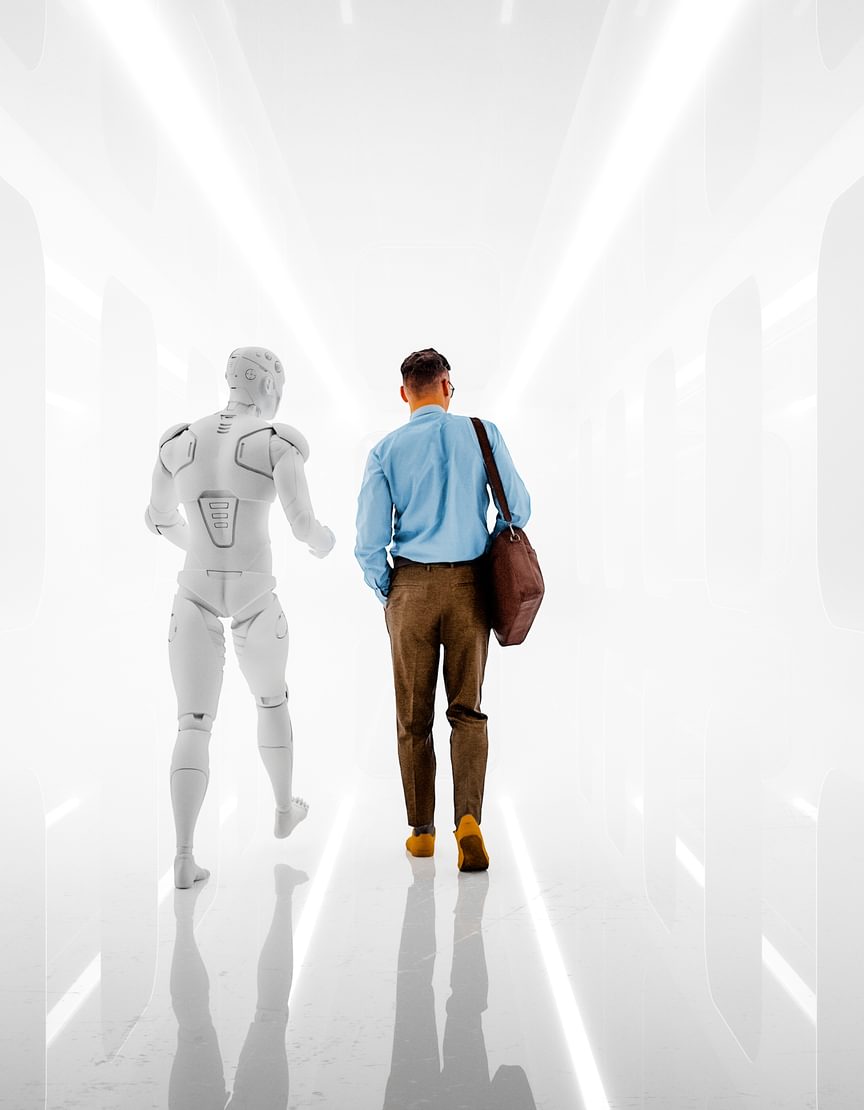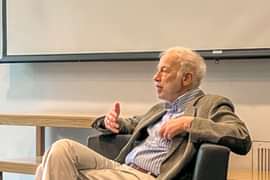
May 06, 2024
AI and the future of learning
Computer science instructor Nick Zufelt and AI expert Chris Meserole ’98 discuss ways tech will enhance educationby Rita Savard
What happens when tech experts, who also happen to be educators, start dreaming about classrooms in 10, 50, and even 100 years from now? Electrified sand, poems about penguins, and all the robot assistants you could ever wish for come up in conversation. And one stark conclusion: Artificial intelligence won’t replace humans, but humans will collaborate closely with AI. In the future, according to mathematics, statistics, and computer science instructor Nick Zufelt and AI safety and ethics expert Chris Meserole ’98, the power of AI is not in improving old processes but rethinking new ones.
Nick: What role do you think Andover, and schools like it, will play in this new era of AI?
Chris: Our daughter is 12 and our son is 10. They will spend the majority of their adult lives working and interacting in a world in which computers are as smart or smarter than they are across a wide array of tasks. Education systems need to be exploring this technology today, and teaching students how to think about it and learn from it and adapt to it now. Schools like Andover also have an opportunity to shape the leaders who will oversee how the technology is governed. It’s incredibly important that the political leaders of tomorrow, who will govern and regulate general purpose AI, understand it intuitively.
Nick: There are many digital natives out there who are incredible content producers but don’t necessarily have any coding experience. Should a computer science or AI education be mandatory?
Chris: Not everyone needs to learn to code, and there are many people who do really important work on the internet but have no idea how the internet works. I think even more than having a computer science requirement, having AI embedded in required classes will be key. And there’s likely a lot of room to leverage what is already in place. English classes can experiment with large language models in generating poetry and prose, while math and statistics classes can illuminate what’s happening under the hood when they do so. For all the apparent magic of modern AI, all the concepts you need to produce it—matrix multiplications, derivatives, basic statistics—are first taught in high school.
Nick: I think an advantage of the AI era is that you can learn in ways that work better for you. I hope we’re going to see more differentiated instruction because, as a teacher, that’s awesome to think about. If every teacher could have all the teaching assistants they could ever need, what opportunities might that open in education?
Chris: A lot! By way of example, around the time ChatGPT first came out, I was helping my daughter, who had just started middle school. She had this science project where she had to learn the difference between rotation and revolution. I kept trying to explain it to her and she was just looking at me like, ‘I have the most boring dad in the world.’ So we sat down and I said, why don’t you ask ChatGPT to explain it in a way that you think would teach you best? So she asked it, ‘Teach me about revolution versus rotation in a poem about penguins—and it has to be funny.’ I could not believe it. What it spat out was perfect. Conceptually, it was exactly right. She learned from it—and thought the poem was hilarious.
These systems are going to do a better job of providing relatable answers based on the technology’s capabilities to know an individual’s personality and their learning style. To me, that has probably been the most impressive part of AI—and has also been very humbling for someone who used to be a teacher.
Nick: I think there’s a strong parallel between how the internet plays a role in education now and how AI will do so in the future. There’s a ton of daily interaction with the internet. But if suddenly someone turned off the internet, an Andover education would still be excellent. I feel like the AI piece needs to eventually reach that same point—where it’s integrated and it’s useful but if we cut it out temporarily, the core of an education is still there; it’s still about the social side of humans interacting with humans.
Chris: Exactly. The social dimension of education can’t be understated. When we talk about AI, what we’re really talking about is just electrified sand. That is what it is materially. It’s not a person, even though we have a tendency to ascribe a moral agency to these systems. Kids learn so much better through socialization, having conversations with their peers and teachers, hearing how others verbalize things, and seeing how they provide social cues. AI will change in some ways, but human beings will still require human connection. We will still need to make sure that our education systems are oriented toward us, that we are learning the right things and building the kinds of future citizens and leaders who are empathetic, empowered, and prosperous.
Chris Meserole ’98 is the executive director of the Frontier Model Forum where he focuses on advancing best practices for AI safety and evaluation.





